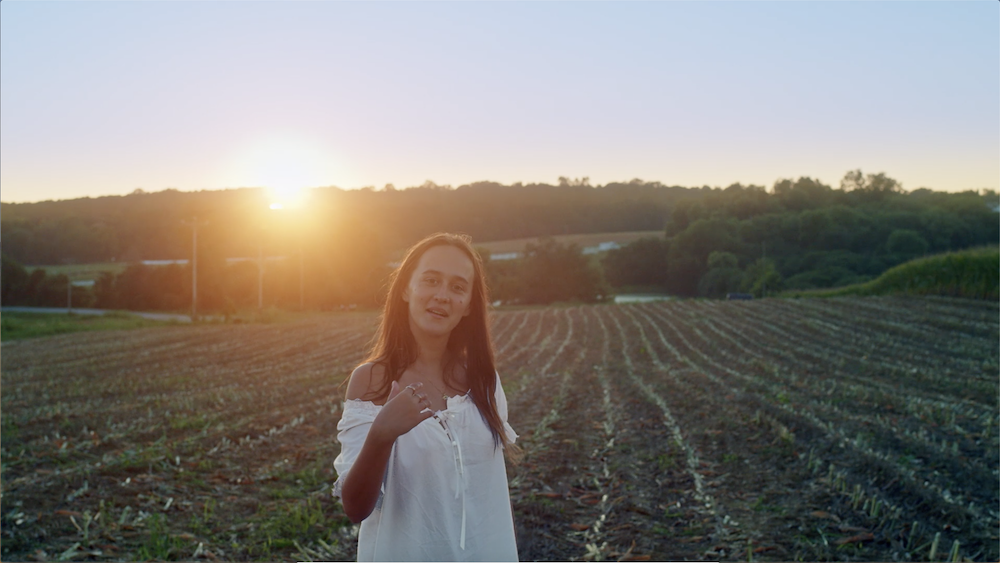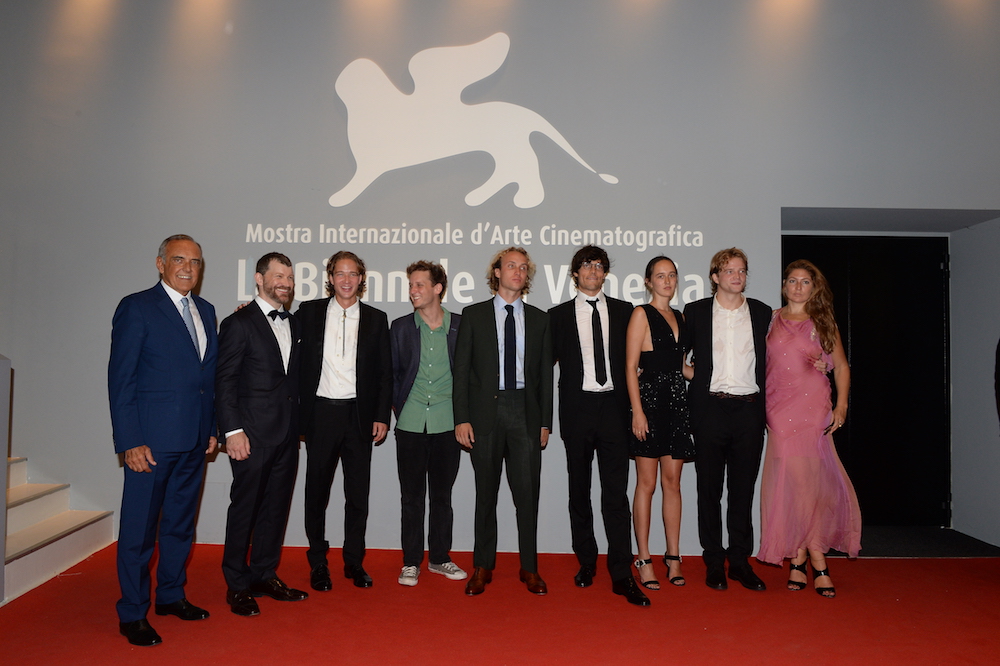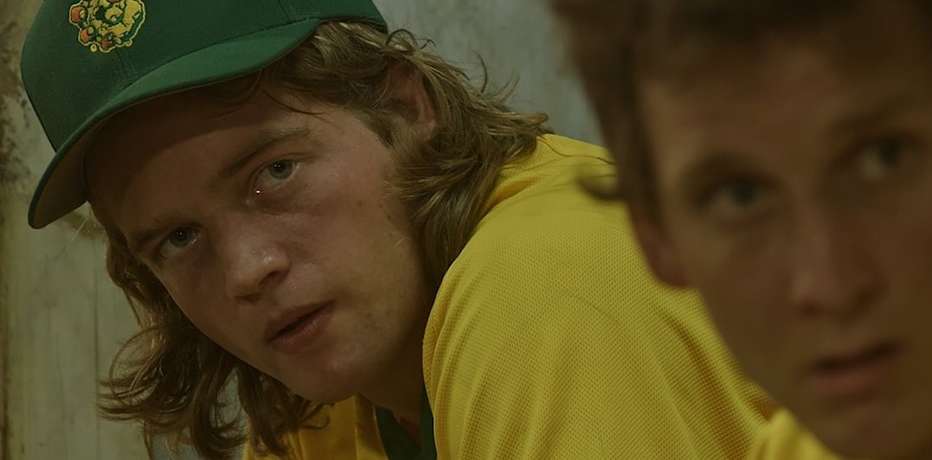I’ll admit it. I only watched ‘Giants Being Lonely’ because of the relentless work by the film’s publicist, who extended my way a wonderful chance to interview the cast and crew. And because of one name, a reminder of a cinematic legacy whose work on and off the screen has accompanied me throughout my adult life, I said yes. The scheduling of the film’s screenings was tricky. I felt at many turns like canceling the whole thing but the publicist seemed unmovable. Little did I know she was arranging THE interview of my festival.
So the name I noticed at first glance, which made the project immediately appealing was Olmo Schnabel. Is there any filmmaker as great at telling an unconventional story through cinema as his father— Julian Schnabel? I mean, to explain on the big screen in a fascinating and entertaining way the lives of Jean-Dominique Bauby, Reinaldo Arenas, Jean-Michel Basquiat and even Vincent Van Gogh, devoid of clichés takes a special kind of genius.
Once Schnabel’s name and legacy had caught my attention, I also noticed Grear Patterson as the film’s director and writer. To those who follow the contemporary art world, Patterson is an American artist whose work has been described as both “dystopian” and “utopian”. I’d limit myself to saying it’s f-ing amazing and totally mesmerizing. So, those two names had me at “hello.”
You are now wondering why you have not heard of ‘Giants Being Lonely’ yet? Because there has been little in the media about it. It’s a specially kept secret at the moment, one only a few lucky audience members in Venice have been privy to.
Reason one is that the film suffers from a tagline and synopsis that is incomprehensible to geezer critics and old-at-heart bloggers who come to festivals to watch films like ‘Joker’ and ‘Ad Astra’. Not that there is anything wrong with watching those films, but come on! Does it really need to be done at film festivals, where unique showings of gems like ‘Giants Being Lonely’ can be found? We are constantly hearing about cinema not being what it used to be. But it’s that we’re not watching films the way we used to… Adventurously. As a film writer, I try to come to a film festival with a fresh mind, a cool attitude and a yearning to watch new cinema — to discover films. Not to view what everyone else is watching and writing about. I could stay home for that.

I’ll admit, even I didn’t know what to expect from the film’s tagline “Life is a misery and I do not know when death may come. Play Ball!” which comes from a Raymond Pettibon screenprint. But I was wonderfully and pleasantly surprised and discovered within ‘Giants Being Lonely’ not only my favorite film at the Venice Film Festival but a true masterpiece of comprehension for Gen Z by a group of filmmakers made up of NYC art and cinema royalty.
While the title of the film comes from the closing line of a Carl Sandburg poem, the story of Patterson’s film centers around a triangle of characters, seniors in the graduating class of a high school in rural North Carolina. Bobby, played by newcomer Jack Irving, seems to have it all. And yet behind his all-American good looks and star turn as MVP on his baseball team, a deep sadness and loneliness are hidden. Adam, played by Jack’s real-life brother Ben Irving, is unrelated to his more successful doppelgänger and yet the genius of the filmmaker here lies in their similar looks, which he mixes up by giving them completely different, almost opposite lives. While deceivingly interchangeable at the start of the story, their inner struggles become more personal as the film progresses and we’re supplied with additional information. Of course, once you meet the brothers in person, as I got to do, there is no more confusion.
Patterson explained casting Jack Irving, “the first time I saw Jack, he came out of his house in his boxers in the middle of the snow. And it was beautiful to watch him move, he walked around Mercer Street like the whole place was his backyard. Kind of the same way he moved around the nature in North Carolina.” Schnabel jumped in to talk about the casting, “I want to mention something which is kind of funny. He [Jack] was going to be Adam and Ben was going to be Bobby.” To which I innocently nodded, “I can see that…”
Schnabel quickly yet kindly rebutted “I can’t!” Followed by a collective giggle from the rest of the cast and crew seated at our table. Yes, because I may not have mentioned this yet, I met Schnabel, Patterson, the Irving brothers and leading lady Lily Gavin who plays Caroline, in Venice. Got to interview them while sitting around a table on the beach of the Excelsior Hotel, on a windy yet perfectly lit afternoon. It was the most magical moment I spent in Venice.

Caroline provides much more than a romantic interest to both the leading men in the film, she adds a pull for the women in the audience, to relate to her doubts and onset of relationship savvy. Throughout the film, she navigates the waters of being a teenage girl and figuring out how to use her sexuality — something ongoing for most women, even later in life.
But the deepest vein, the true poignancy of ‘Giants Being Lonely’ is how well it explains the hopelessness of the Millennials and Gen Z, who feel like they’ve inherited a really messed up world from us, those who inhabited it before them. Their parents may be the official authority figure, but Patterson explained it best when he said, quite off the cuff, “I feel like my whole life I was taking care of my parents.”
It’s this idea of carrying the weight of the world on their shoulders which has made the current generations so burdened with sadness and fears — and it’s explained perfectly in the film. In fact, when I mentioned it to Patterson, he chimed in “what you said is pretty on point actually, because it all comes from my own experience growing up. All my friends and I, we all related, we had a large amount of neglect, a large amount of time alone. All the baby boomers who had kids basically left their kids unattended.” But he added, optimistically, “I think probably for better or for worse, it’s going to breed a stronger generation hopefully. It came from our experiences, we all can relate, we all have the same universal feeling.”

Don’t expect to go into ‘Giants Being Lonely’ with an aging heart — full of the preconceived prejudices the older generations typically have towards Gen Z — and enjoy the film. It will shake you to the core and make you rethink how every single action, all our collective moves have brought us to the world we are leaving behind, for those who are inheriting it from us. Articles like this one try to explain their hopelessness but Schnabel addressed it best:
“It’s interesting because we all come from different families, different situations but for some reason there is a shared feeling between all of us and we can all relate to that feeling — of loneliness, the feeling of not knowing what’s going to come. When life seems very intimidating, because you’re part of a family, you go to school, you’re raised and somehow you have to become a person and that idea, that question is something the characters are confronting and that’s what the movie is about. And at that moment there is some people who survive, some who figure it out and keeps going and some people who drown in that and it strangles them and they don’t make it.”
The character of Adam in the film is one such person but I’m not giving anything away by writing that the ending of ‘Giants Being Lonely’ will leave you breathless. Gavin talked about friends who succumbed to the sadness, “when you’re alone and young and you don’t know how to get through those emotions, it’s a very heavy thing. We’ve lost friends over the last couple of years from that heaviness of emotional consciousness.” Schnabel explained they were one “cousin and a friend of mine, both young people, who had their lives ahead of them and everything, people who loved them. Two boys who were artists and sensitive. The movie has a silence to it but that silence is symbolic of when you’re going through those feelings, at that age it’s difficult to communicate and you don’t want to be vulnerable — because if you’re vulnerable you’re weak.”
For Jack Irving, Bobby proved almost therapeutic to play. He explained his character “I think there is an amazing thing where I don’t really have any worldly possessions and I don’t have an outlet for my emotions and my feelings. But it’s OK, and I take to nature and I take to running around and swimming and kind of like interacting with people.” He then turned serious to caution, “people with their phones, the fact there are no phones in the movie. The thing that was most interesting to me, and was in my mind preparing the whole time — there’s kids growing up now and every aspect of their life, there will be a picture on their phone to scroll back to, like their three-year old self. That must be so strange. We’re kind of lucky to get out just in time.”
Ben Irving described his own preparation for the role of Adam, “I had an easy time latching on to those emotions. We [Jack and Ben] both took acting classes in preparation for these roles from this one coach, who really had us delve into our past as brothers. And we would bring up personal topics in relation to Adam and Bobby. I know they weren’t siblings in the film, but in many ways in preparing for the roles they were. Even though it’s not specifically said that comes out in the film. ” When I chimed in to say that the two characters seemed interchangeable to me, Schnabel added “they are the yin and the yang. In some ways they are one boy. At the end of the movie, when they are looking at each other, the story blends.”
Schnabel also explained best what the film is meant to do, “at first it will make some people uncomfortable when they’re sitting there and don’t know quite what’s happening but I think that’s within the nature of the subject we’re talking about and we’re trying to address. It’s for people to come in there, use their experience and relate to it. And the fact that people can relate to it in different ways that’s what we wanted to accomplish and that tells us it’s a success.”
‘Giants Being Lonely’ plays next at the Zurich Film Festival at the end of September.


